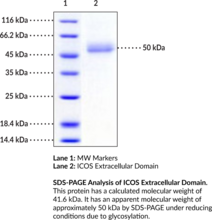Territorial Availability: Available through Bertin Technologies only in France
- Correlated keywords
- CD 278 CVID 1 IgG HEK 293 costimulator CD 28 278 B 7 costimulatory di-sulfide PI3-K CD4 CD 4 8 CD8 interleukin IL4 IL5 IL6 IFN? TNF? GMCSF IL2 IL10 antiICOS anti body AA Glu 21
- Product Overview:
Inducible T cell co-stimulator (ICOS) is a glycoprotein and member of the CD28/B7 family of co-stimulatory receptors that promotes T cell activation.{57036} It exists as a membrane-bound disulfide-linked homodimer and contains a leader peptide, an extracellular domain that interacts with ICOS ligand (ICOSL), and a cytoplasmic tail that mediates association with PI3K and is critical for T cell activation.{57036,57037} ICOS is expressed on activated CD4+ and CD8+ T cells following T cell receptor crosslinking and/or co-stimulation by CD28.{57036} ICOS co-stimulation of T cells induces production of IL-4, IL-5, IL-6, IFN-? (Item Nos. 32008 | 32078), TNF-? (Item Nos. 32020 | 32069), and GM-CSF (Item Nos. 32044 | 32079), but not IL-2, and superinduces production of IL-10, as well as prevents T cell apoptosis.{57037} Human melanoma cells express ICOSL and promote the expansion of ICOS+ IL-10-secreting regulatory T cells, which is positively correlated with unfavorable clinical outcomes.{57039} Administration of an anti-ICOS monoclonal antibody ameliorates mucosal inflammation and damage in a mouse model of T helper cell-induced chronic colitis.{57038} Cayman’s ICOS/CD278 Extracellular Domain (human, recombinant) protein can be used for ELISA. This protein is a disulfide-linked homodimer. The reduced monomer, comprised of ICOS (amino acids 21-141) fused to His-tagged human IgG1 Fc at its C-terminus, consists of 386 amino acids, has a calculated molecular weight of 41.6 kDa, and a predicted N-terminus of Glu21 after signal peptide cleavage. As a result of glycosylation, the monomer migrates at approximately 50 kDa by SDS-PAGE under reducing conditions.
Cayman Chemical’s mission is to help make research possible by supplying scientists worldwide with the basic research tools necessary for advancing human and animal health. Our utmost commitment to healthcare researchers is to offer the highest quality products with an affordable pricing policy.
Our scientists are experts in the synthesis, purification, and characterization of biochemicals ranging from small drug-like heterocycles to complex biolipids, fatty acids, and many others. We are also highly skilled in all aspects of assay and antibody development, protein expression, crystallization, and structure determination.
Over the past thirty years, Cayman developed a deep knowledge base in lipid biochemistry, including research involving the arachidonic acid cascade, inositol phosphates, and cannabinoids. This knowledge enabled the production of reagents of exceptional quality for cancer, oxidative injury, epigenetics, neuroscience, inflammation, metabolism, and many additional lines of research.
Our organic and analytical chemists specialize in the rapid development of manufacturing processes and analytical methods to carry out clinical and commercial GMP-API production. Pre-clinical drug discovery efforts are currently underway in the areas of bone restoration and repair, muscular dystrophy, oncology, and inflammation. A separate group of Ph.D.-level scientists are dedicated to offering Hit-to-Lead Discovery and Profiling Services for epigenetic targets. Our knowledgeable chemists can be contracted to perform complete sample analysis for analytes measured by the majority of our assays. We also offer a wide range of analytical services using LC-MS/MS, HPLC, GC, and many other techniques.
Accreditations
ISO/IEC 17025:2005
ISO Guide 34:2009
Cayman is a leader in the field of emerging drugs of abuse, providing high-purity Schedule I-V Controlled Substances to federally-licensed laboratories and qualified academic research institutions for forensic analyses. We are certified by ACLASS Accreditation Services with dual accreditation to ISO/IEC 17025:2005 and ISO Guide 34:2009.





